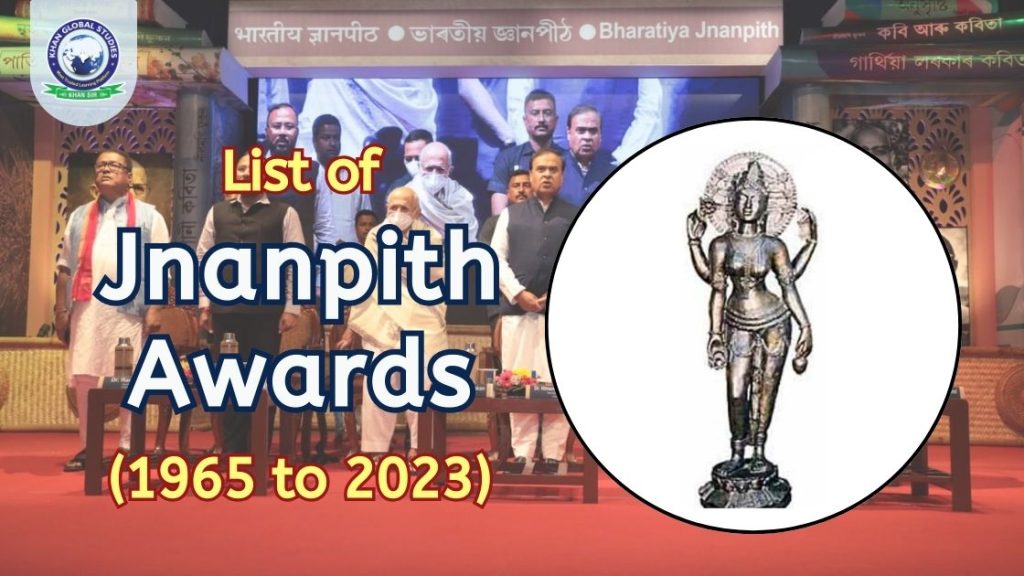The Jnanpith Award, India’s highest literary award, is given annually for the best creative literary writing in any of the 22 scheduled languages recognized in the Indian Constitution and, since 2013, in the English language. The award carries a cash prize, a citation and a bronze replica of Vagdevi (Saraswati), the goddess of knowledge. This cultural organization is sponsored by the Bharatiya Jnanpith.
About Jnanpith Award
The Jnanpith Award was started in 1961 and the first award was given in 1965. Until 1982, this award was given for some specific work; Subsequently, it was given for an author’s overall contribution to literature. Since then, the award has generally been awarded to one author each year, although it has been awarded jointly to two authors in some years. Among the recipients of the Jnanpith Award, are G. Shankar Kurup and Ashapurna Devi, the first women to win this award. In 2018, Amitav Ghosh became the first English author to receive the Jnanpith Award.
Background
The Jnanpith Award was founded by Sahu Shanti Prasad Jain. He is the founder of the Bharatiya Jnanpith, a research and cultural institute established in 1944. He wanted to institute an award that would recognize and celebrate the outstanding contributions of Indian writers.
The first Jnanpith Award was given to G Shankar Kurup in 1965. This was for his poetry collection Odakkuzhal in Malayalam. Since then, the award has been given to many of India’s most renowned writers. This includes Rabindranath Tagore, Premchand, R.K. Narayan, and Arundhati Roy.
The selection process for the Jnanpith Award
- First, proposals are submitted by various teachers, litterateurs, associations, organizations, universities, etc.
- For each language, there is a Language Advisory Committee, consisting of three eminent literary scholars and critics. They consider works/authors through proposals or suggested by other authors and evaluate the literary creativity of the author based on established criteria.
- The recommendations made by the various Language Advisory Committees are put before a selection board, which comparatively evaluates the recommendations and selects the award winner for the year.
List of Jnanpith Awards (1965-2023)
| Year | Name | Language |
| 1965 (1st) | G. Sankara Kurup | Malayalam |
| 1966 (2nd) | Tarasankar Bandyopadhyay | Bengali |
| 1967 (3rd) | Umashankar Joshi | Gujarati |
| Kuppali Venkatappa Puttappa ‘Kuvempu’ | Kannada | |
| 1968 (4th) | Sumitranandan Pant | Hindi |
| 1969 (5th) | Firaq Gorakhpuri | Urdu |
| 1970 (6th) | Viswanatha Satyanarayana | Telugu |
| 1971 (7th) | Bishnu Dey | Bengali |
| 1972 (8th) | Ramdhari Singh ‘Dinkar’ | Hindi |
| 1973 (9th) | D. R. Bendre | Kannada |
| Gopinath Mohanty | Odia | |
| 1974 (10th) | Vishnu Sakharam Khandekar | Marathi |
| 1975 (11th) | Akilan | Tamil |
| 1976 (12th) | Ashapoorna Devi | Bengali |
| 1977 (13th) | K. Shivaram Karanth | Kannada |
| 1978 (14th) | Sachchidananda Vatsyayan | Hindi |
| 1979 (15th) | Birendra Kumar Bhattacharya | Assamese |
| 1980 (16th) | S. K. Pottekkatt | Malayalam |
| 1981 (17th) | Amrita Pritam | Punjabi |
| 1982 (18th) | Mahadevi Varma | Hindi |
| 1983 (19th) | Masti Venkatesha Iyengar | Kannada |
| 1984 (20th) | Thakazhi Sivasankara Pillai | Malayalam |
| 1985 (21st) | Pannalal Patel | Gujarati |
| 1986 (22nd) | Sachidananda Routray | Odia |
| 1987 (23rd) | Vishnu Vaman Shirwadkar ‘Kusumagraj’ | Marathi |
| 1988 (24th) | C. Narayana Reddy | Telgu |
| 1989 (25th) | Qurratulain Hyder | Urdu |
| 1990 (26th) | Vinayaka Krishna Gokak | Kannada |
| 1991 (27th) | Subhash Mukhopadhyay | Bengali |
| 1992 (28th) | Naresh Mehta | Hindi |
| 1993 (29th) | Sitakant Mahapatra | Odia |
| 1994 (30th) | U. R. Ananthamurthy | Kannada |
| 1995 (31st) | M. T. Vasudevan Nair | Malayalam |
| 1996 (32nd) | Mahasweta Devi | Bengali |
| 1997 (33rd) | Ali Sardar Jafri | Urdu |
| 1998 (34th) | Girish Karnad | Kannada |
| 1999 (35th) | Nirmal Verma | Hindi |
| Gurdial Singh | Punjabi | |
| 2000 (36th) | Mamoni Raisom Goswami | Assamese |
| 2001 (37th) | Rajendra Shah | Gujarati |
| 2002 (38th) | Jayakanthan | Tamil |
| 2003 (39th) | Vinda Karandikar | Marathi |
| 2004 (40th) | Rehman Rahi | Kashmiri |
| 2005 (41st) | Kunwar Narayan | Hindi |
| 2006 (42nd) | Ravindra Kelekar | Konkani |
| Satya Vrat Shastri | Sanskrit | |
| 2007 (43rd) | O. N. V. Kurup | Malayalam |
| 2008 (44th) | Akhlaq Mohammed Khan ‘Shahryar’ | Urdu |
| 2009 (45th) | Amarkant | Hindi |
| Sri Lal Sukla | Hindi | |
| 2010 (46th) | Chandrashekhara Kambara | Kannada |
| 2011 (47th) | Pratibha Ray | Odia |
| 2012 (48th) | Ravuri Bharadhwaja | Telugu |
| 2013 (49th) | Kedarnath Singh | Hindi |
| 2014 (50th) | Bhalchandra Nemade | Marathi |
| 2015 (51st) | Raghuveer Chaudhari | Gujarati |
| 2016 (52nd) | Shankha Ghosh | Bengali |
| 2017 (53rd) | Krishna Sobti | Hindi |
| 2018 (54th) | Amitav Ghosh | English |
| 2019 (55th) | Akkitham Achuthan Namboothiri | Malayalam |
| 2021 (56th) | Nilamani Phookan | Assamese |
| 2022 (57th) | Damodar Mauzo | Konkani |
| 2023 (58th) | Rambhadracharya | Sanskrit |
| Gulzar | Urdu |
Facts about the Jnanpith Award for UPSC
- Jnanpith Award has achieved the recognition of the country’s highest literary award.
- The award is open only to Indian citizens and is given annually.
- English is considered for the award along with other Indian languages.
- The winner gets a cash prize of Rs. 11 Lakhs and a bronze replica of Goddess Saraswati, the Hindu goddess of learning.
- The first recipient of this award was Malayalam writer G Shankar Kurup in 1965, for his novel ‘Odakkuzhal’ (The Bamboo Flute).
- The first woman writer to be honoured with this award was Bengali writer Ashapurna Devi in 1976.
- This award-giving organization was founded in 1944 by industrialist and philanthropist Sahu Shanti Prasad Jain.
- The Jnanpith Award is sponsored by the cultural organization Bharatiya Jnanpith.
FAQs
Question: When was the Jnanpith Award instituted?
Answer: 1961.
Question: Who was the first recipient of the Jnanpith Award?
Answer: Malayalam poet G Shankar Kurup was the first recipient of the Jnanpith Award, receiving the award in 1965 for his poetry collection titled Odakkuzhal.
Question: Which language has received the highest Jnanpith award?
Answer: Out of the 23 eligible languages, literary works in Hindi have received the highest Jnanpith award. Jnanpith Award has been given 11 times for Hindi literary works. After Hindi, Kannada works have received the maximum number of Jnanpith awards.
Question: Who was the first woman to receive the Jnanpith Award?
Answer: Bengali writer Ashapurna Devi was the first woman to receive the Jnanpith Award. He was given this award in the year 1976 for his novel Pratham Pratishruti.
Also Read:
- Central Excise Day: History, Important Facts and Purpose
- An Overview of FEMA (Foreign Exchange Management Act), 1999



